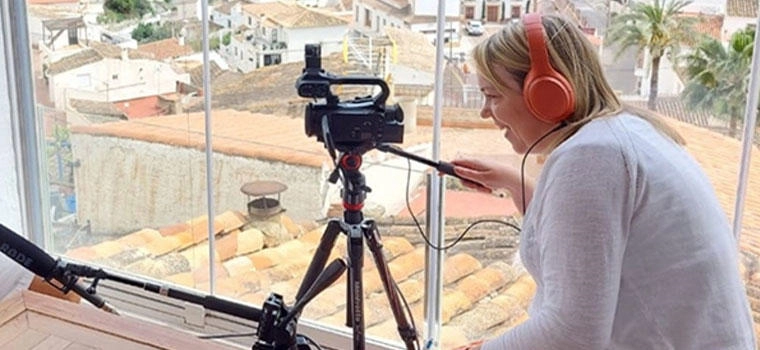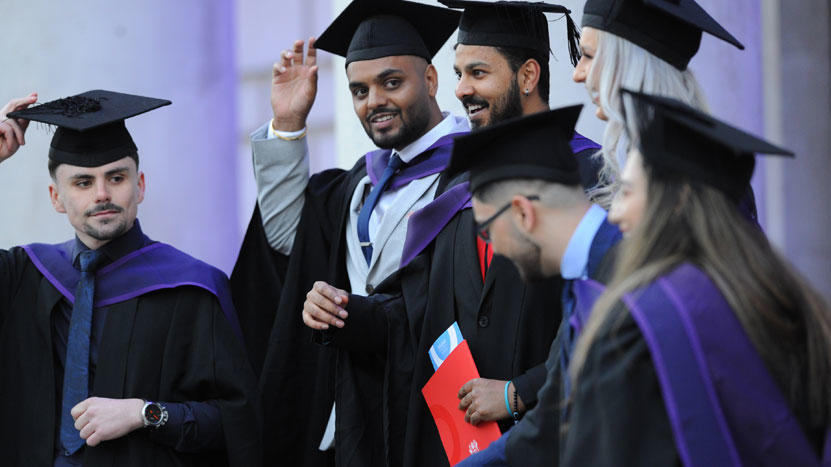
“The lecturers taught us how to think like a broadcast journalist and grab any opportunity coming our way.”


Bring your sports knowledge to radio, the internet or television screens for an exciting career in sports journalism.
On this advanced-level course, students learn how to source, gather and deliver professional sports content on numerous different video and audio platforms across a wide variety of sports. The course also encourages students to develop their editorial and technical skills and build relationships with external clients, whilst creating a portfolio of video, audio and academic material to showcase their abilities to potential employers.
With an increasing demand from sports audiences for innovative approaches to storytelling and high-quality production, broadcasters must constantly update their practices and utilise social media to research and promote their work. Understanding and adapting to changes within this fast-moving industry is core to the teaching on this master’s degree.
Regular news days, where students will need to respond, gather and produce stories for a same-day news and radio output, are built into the course programme to further increase students’ exposure to a realistic broadcast environment and prepare them for the deadlines and quick-thinking they’ll need to demonstrate to become a sports broadcaster.
Accredited by:

As part of your studies you will have the opportunity to undertake a work experience placement
This course has access to specialist facilities
You can apply direct to Solent University for this course
You can study this course part-time
This course is well-suited to those with a sport or journalism background who wish to move into sports broadcasting across traditional and digital platforms.
The course content is ideal for students wishing to gain a deep understanding of the technical and practical aspects of broadcasting.
The course curriculum is centred on students gaining essential knowledge and practical skills in sports broadcast journalism.
The course team are current industry professionals engaged in regular broadcast practice with television and radio channels such as Sky Sports, Sky Sports News, BT Sport, ITV, BBC, BBC Radio Solent.
The University cannot guarantee any particular members of staff will teach specific aspects of the course in the future, but will endeavour to ensure the teaching team maintains their balance of experience and qualifications.
Students on this course have full access to the University’s industry-standard broadcast facilities, which include four television studios, eight radio studios and extensive editing and production facilities which are configured to the industry standard. High definition camera equipment is also available to all video production students.
Students also have access to camera equipment and professional recording devices, plus radio and TV studios, as well as use of computers with Final Cut Pro X and Adobe Audition, plus the use of normal Solent resources, such as the library.
The module begins with teaching in how to produce TV and radio content, plus law and ethics, broadcast specialisms (commentary, voice training, social content). Weekly industry-style news days then form the rest of the module as you refine and perfect your TV and radio skills through eight-hour days with live output and real deadlines, including reacting to breaking news.
This is an academic module looking at the history of sports broadcasting and the global issues surrounding sport, for example: commercialisation, racism, corruption/match-fixing, mega events, sports politics, gender, disability, migration, and how it has become a multi-billion pound business which dictates policy.
This module provides an opportunity to move away from live sports output and investigates longer-form features and documentaries for TV or radio. You will be taught new production techniques, plus the processes involved in pitching and getting a documentary commissioned.
This module looks at you career goals and identifies skill-sets and development needs. As part of this module you will undertake a four-week work placement in the broadcasting industry which will give you real-world experience and enhance your CV to help you gain employment after completing the course.
You will use the knowledge learned from your theory and practical modules to produce an extended radio or television feature that demonstrates your professional attainment as your major final project.
The module materials are posted on the VLE and students are expected to have reviewed them prior to attending class. The materials include journal articles, videos and web-based materials. The minimum standards for VLE are met and exceeded.
Students will upload their work to the Solent Journalism website and will curate the Solent Sports News X account on news days. Students will also be learning about and using existing social content sites, plus any new sites that come to the fore.
We will also broadcast live from the radio and TV studios to the world, via livestream.


Hear from Solent alumni about where their careers have taken them and how studying at Solent prepared them for their future.
Read more stories
“The lecturers taught us how to think like a broadcast journalist and grab any opportunity coming our way.”

Students will gain a multitude of transferable skills on the course. The industry newsdays will provide new skills in gathering, shooting, editing, writing, producing and creating engaging broadcast output. These can be used in a variety of non-broadcast roles, including social media content and corporate videos.
On top of these visible skills, students will also leave with a great deal of experience in: Team work, delegating, working to tight deadlines, working under pressure, vocalising ideas, presenting themselves on screen and in everyday life, increased confidence, interview skills and much more.
The course builds on Solent’s current relationships with professional and amateur sports clubs in the South, including Hampshire County Cricket Club, for whom the University is an official provider of video content, and Southampton Football Club. Previous students on our sports journalism courses have benefitted from guest lectures and workshops by industry speakers.
Working in sports journalism can carry with it long, demanding and unsociable hours – but there is nothing better than being able to mix your working life with your passions. If you are willing to work hard and you have the right approach, the job satisfaction is huge.
The MA Sports Broadcast Journalism course is taught by lecturers who are all still working in the industry (Sky Sports, ITV, BT Sport, BBC Radio Solent) which means that getting high-profile guests in to talk is very easy. The guest lecturers have come down to do Q&As, mock interviews, critique work and offer career advice.
Recent broadcast guests include: Sarah Gomme and Fred Dinenage (ITV Meridian); Tom Hepworth (BBC South Today); Nigel Dean (Sky Sports); Chris Eldergill (CNN World Sport); Jeff Freeman (IMG); Paul Belverstone (Premier League Productions).
Being a sports journalist gives you a free pass to some of the best events in the sporting calendar and the chance to meet your sporting heroes. Plus you can adapt the skills you learn on this degree to almost any workplace, as we embed in our students a need to question, research, fact-check and network.



Hear from Solent alumni about where their careers have taken them and how studying at Solent prepared them for their future.
Read more stories
“The lecturers taught us how to think like a broadcast journalist and grab any opportunity coming our way.”

The Solent Careers team is committed to getting students into great careers.
While you are studying, the team can help you with finding work experience or placements, link you with a mentor, check your CV, or offer one-to-one guidance.
If you're in your final year, we also have graduate job opportunities just for Solent graduates.

6th
UK uni for sustained employment
Longitudinal Educational Outcomes, 2022
Accredited by:

As part of our global alumni community, you can take advantage of a range of benefits.
Whether it's been days or decades since you left us, or you're soon to don your cap and gown, things are constantly changing at Solent. We're always innovating, but we're also immensely proud of our heritage. And that means you.

Research doesn't just live in publications and journals - the effects of groundbreaking research can be found everywhere you look. That's why research at Solent has always been firmly rooted in industry needs and real-world application.
Solent University prides itself on carrying out not only pioneering research, but also research that addresses real world problems. We offer opportunities to study for a Master of Philosophy (MPhil) or Doctor of Philosophy (PhD) degree in a number of areas.
At Solent, we want to help you achieve your best and discover new insights. Whether you're thinking about applying for a PhD, or already underway with your research studies, you'll find useful guidance and information in our research pages.
Research at SolentThe tuition fees for the 2025/26 academic year are:
For further information, please see our tuition fees page.
While most course costs are covered by your tuition fees, some essential resources and optional extras may need to be paid for separately. These additional costs are listed below. For advice on budgeting and managing your money, please contact student.funding@solent.ac.uk.
The 2025/26 other costs are not yet available. For guidance, previous other costs have been:
Compulsory costs
External hard-drive for video (approx £50)
SD Card for radio (approx £5)
Solent alumni are eligible for a 20% reduction of tuition fees if returning to study a postgraduate course.
Find out moreSolent University offers a range of bursaries and scholarships that provide financial assistance or waive fees for tuition or accommodation. Each bursary or scholarship has specific eligibility criteria. Check out our bursaries and scholarships pages to find out more.
Cost of living support
At Solent, we understand that the cost of living crisis may be of some concern. To help, we've put together some detailed information to show what support is available and how to make your money go further.
There is no charge to attend graduation, but you will be required to pay for the rental of your academic gown (approximately £45 per graduate, depending on your award). You may also wish to purchase official photography packages, which range in price from £15 to £200+. Graduation is not compulsory, so if you prefer to have your award sent to you, there is no cost. Extra guest tickets will go on sale after results publication and will be sold on a first-come-first-served basis. The cost per ticket is currently £15. Please note, we do not guarantee there will be any extra tickets available to purchase.
Please select an option below:
If you are applying from outside the UK, find information about entry requirements, visas and agents for your country here.
For further information about UK, EU and international qualifications, please contact admissions.
If you are applying from outside the UK, find information about entry requirements, visas and agents for your country here.
For further information about UK, EU and international qualifications, please contact admissions.
All international applicants need to be aware that the English language requirements to attend Solent University, and the English language requirements to obtain a visa from the Home Office, may be different. This means that if you meet the Solent University language requirement to gain a place on the course, you may still have to meet additional requirements to be granted with a visa by the Home Office.
We strongly advise all applicants to visit the Home Office website which outlines all the requirements for a successful visa application and to take a look at our course entry statement document.
An honours degree at2:2 or higher
Applications for postgraduate courses can be made at any time prior to the start of the course. However, we strongly recommend you apply at your earliest convenience.
Please ensure you upload the following mandatory documents with your application:
Applicants who do not have English as their first language will be required to demonstrate an approved level of proficiency in the use of the English language. The agreed minimum requirements for this course are:
Qualifications are checked before enrolment, and international students must bring their original certificates or certified copies when coming to study at the University.
Pre-Sessional English programme
The University also offers a pre-sessional English programme for international students who wish to improve their level of English before starting a degree course.


